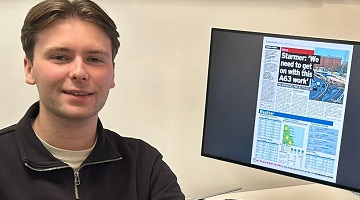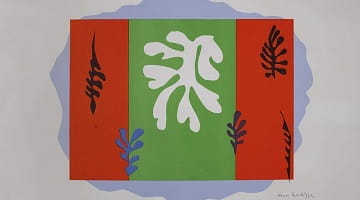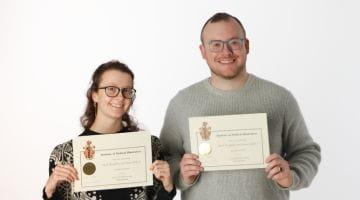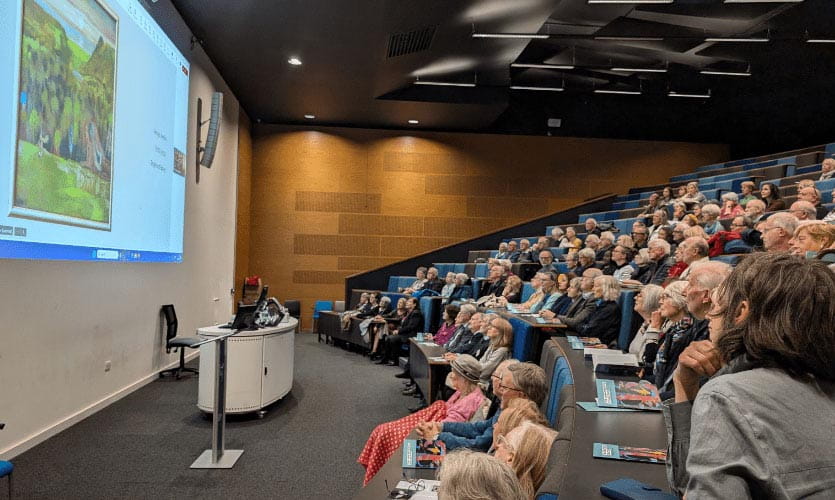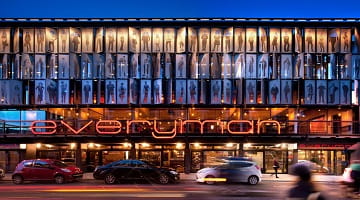About this course
Exploring, experimenting and creating experiences and applications in augmented, extended, mixed and virtual realities, installation, performance, and sensor-based media.
- This Immersive Media postgraduate course will explore storytelling, experience design and development with immersive and creative technology
- Taught in a city with a long history of innovation across games, film and creative technology (Immersive Economy Report, 2019)
- Dedicated lab spaces and access to a range of production facilities across the Screen School and the Liverpool School of Art and Design. Including a range of specialist VR, AR and MR development and display (headsets, spectacles, projection) technologies
- Software workshops include, Unreal, Unity, Blender, Gravity Sketch, Isadora, TouchDesigner and Adobe Creative Suite... though we are software agnostic and story first
- A Collaborative Project run in partnership with industry partners in the creative media sector, to develop real world projects
- Looking at the application of immersive content and technology across a range of sectors
"Immersive experiences require novel narrative mechanisms and new language of production... The best technology will not produce the change needed without equal excellence in content production and understanding of immersion as a narrative form."
-Creative Industries Review, 2017
In 2019, a research symposium at the Redmonds Building, home of Liverpool Screen School and the MA Immersive Media programme, explored how researchers, developers and practitioners are approaching the emerging mediums of virtual reality, augmented reality and mixed reality for storytelling. The day included eight panels exploring the diverse ways in which people are engaging with new technologies and speakers included creative writers, theatre makers, game developers, filmmakers, artists, creative coders and a range of disciplines to discuss the immersive storytelling experiences research symposium.
Companies included Marshmallow Laser Feast, Draw and Code, Limbik Theatre, Pilot Theatre, Boom Clap Play, Kinicho, Production Park and Charisma.ai.
"We are the last generation to know a blank space."
-Dave Lorenzini (Draw & Code), talking to students about the future of XR, 2022.
Course modules
Discover the building blocks of your programme
Further guidance on modules
Modules are designated core or optional in accordance with professional body requirements, as applicable, and LJMU’s Academic Framework Regulations. Whilst you are required to study core modules, optional modules provide you with an element of choice. Their availability may vary and will be subject to meeting minimum student numbers.
Where changes to modules are necessary these will be communicated as appropriate.
Core modules
Professional accreditation
The Liverpool Screen School is a BAFTA albert Education Partner and proud to be working with albert to arm students with the sustainability knowledge they’ll need when joining the screen industries. BAFTA albert is the leading screen industry organisation for environmental sustainability.

Your Learning Experience
An insight into teaching on your course
Study hours
Full time students will have a learning commitment of approximately 35 hours a week with two full teaching days based at the Screen School and School of Art and Design's Mount Pleasant campus.
Teaching methods
You will be taught using a variety of methods, including: workshops, creative lab sessions, tutorials, seminars, visiting speakers and collaborative projects.
Applied learning
Immersive Media students will have access to dedicated lab spaces and access to a range of production facilities across the Screen School and School of Art and Design. Your final research project will enable you to innovate, develop and exhibit, a substantial immersive experience, using this range of fantastic facilities.
How learning is monitored on your programme
To cater for the wide-ranging content of our courses and the varied learning preferences of our students, we offer a range of assessment methods on each programme.
Assessments on the programme will be conducted using a variety of methods including: proposals, essays, prototypes and creative installations.
Where you will study
What you can expect from your School
Liverpool Screen School is based in the Redmonds Building, in the heart of the bustling Mount Pleasant Campus and Liverpool's growing Knowledge Quarter. Redmonds is shared by two Schools within the Faculty of Arts, Professional and Social Studies Liverpool Screen School and the School of Law - and Liverpool Business School, making for a rich blend of student learning experiences. The building is home to high quality lecture theatres and seminar rooms, broadcast studios, news rooms, media production suites, social spaces and a cafe. Liverpool School of Art and Design is housed in the RIBA award winning John Lennon Art and Design Building in the Mount Pleasant Campus and offers extensive studio spaces, lecture theatres and a dedicated public exhibition space. Both teaching buildings are only a short walk from LJMUs Aldham Robarts Library, which contains all the resources you will require for your studies.
Course tutors
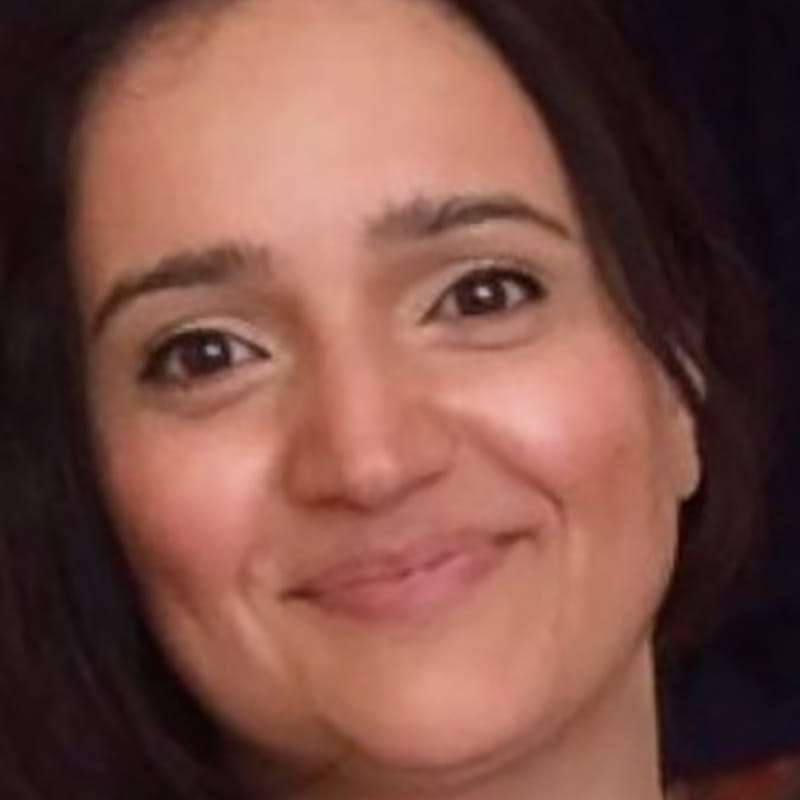
Dr Hatana El-Jarn
- Programme leader
It's a really exciting time to be working at the intersection of creativity, storytelling and technology. Students on this course will be inventing new ways to engage audiences in immersive experiences, learning about the emerging business models of the growing immersive content sector and coming up with new ideas for experiences and applications of immersive storytelling.
It's a really exciting time to be working at the intersection of creativity, storytelling and technology. Students on this course will be inventing new ways to engage audiences in immersive experiences, learning about the emerging business models of the growing immersive content sector and coming up with new ideas for experiences and applications of immersive storytelling.
I have been at LJMU since 2000, when I arrived to develop and then lead an MA in New Media Production. More lately I have run an MRes in Screen and Interactive Media but the bulk of my time is concerned with teaching on the, BA Media Production here at the Liverpool Screen School.Before returning to academia, I was involved in more commercial endeavors. After a period involved in theatre, BFI funded short film-making, video installation and live video performance and lighting design at, The Haienda, I set up an independent production company with offices in both Manchester and on Tin Pan Alley in London. We created documentaries and music videos for a number of recording artists; from the sublime, A guy called Gerald and the Jesus and Mary Chain, to the ridiculous, Wet Wet Wet and Bob Geldof. Additionally, I was involved in creating video and light installations, which were exhibited in a number of locations including the, ICA in London and venues in Paris, New York, Chicago, Detroit and Manchester.Currently, my interests lie in storytelling, the enquiry into new narrative structures, whether passive or interactive for new audience contexts.
Career paths
Further your career prospects
LJMU has an excellent employability record with 96% (HESA 2018) of our postgraduates in work or further study six months after graduation. Our applied learning techniques and strong industry connections ensure our students are fully prepared for the workplace on graduation and understand how to apply their knowledge in a real world context.
This degree is aimed at preparing graduates for creative and technical roles in games, marketing, film, design and the arts sector. Successful and motivated graduates of the programme will also receive opportunities to progress to PhD study to develop new and exciting technologies.
Tuition fees and funding
- Home fee:
- £8,965
Fees
The fees quoted above cover registration, tuition, supervision, assessment and examinations as well as library membership and student IT support with access to printed, multimedia and digital resources including programme-appropriate software and on campus wifi.
Financial Support
There are many ways to fund postgraduate study for home and international students. From loans to International Scholarships and subject-specific funding, you’ll find all of the information you need on our specialist postgraduate funding pages. The University offers a range of financial support for students. You'll find all the information you need on our specialist financial support pages including details of the Student Support Fund and other activities to support with the cost of living.
Additional Costs
In addition to fees, students should also keep in mind the cost of:
- Accommodation
- Travel costs and field trips unless paid for by LJMU
- Stationery, IT equipment, professional body membership and graduation gown hire
Entry requirements
You will need:
Qualification requirements
How to apply
Securing your place at LJMU
To apply for this programme, you are required to complete an LJMU online application form. You will need to provide details of previous qualifications and a personal statement outlining why you wish to study this programme.
Your university life
From accommodation and academic support to clubs and societies. Find out what LJMU has to offer.
Related Links
Talk to our students
Connect with a current LJMU student for advice and guidance on university life, courses and more.
See what our students are saying
At LJMU we want you to know you’re making the right choice by studying with us. You can see what our students are saying about their experience with us via the following websites:
Related Links
News and views
Browse through the latest news and stories from the university
The University reserves the right to withdraw or make alterations to a course and facilities if necessary; this may be because such changes are deemed to be beneficial to students, are minor in nature and unlikely to impact negatively upon students or become necessary due to circumstances beyond the control of the University. Where this does happen, the University operates a policy of consultation, advice and support to all enrolled students affected by the proposed change to their course or module.





















